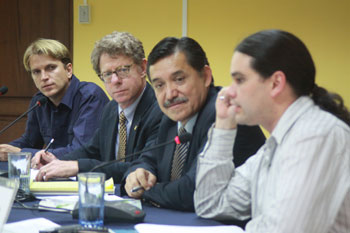In Central America, IICA, SICTA, CIAT, and several agricultural innovation institutes are conducting studies aimed at increasing the productivity of these staple crops, and their resistance higher temperatures, drought, and changes in rainfall patterns.

San Jose, Costa Rica, September 10, 2012 (IICA).Greater use of sustainable production techniques, the diversification of the ways which income from agriculture is used and obtained, and the generation of income from other, non-agricultural sources are some of the strategies that maize and bean producers in Central America could employ to mitigate and adapt to climate change.
Researchers in the region are also endeavoring to identify varieties of germplasm of the two crops that could offer better resistance to higher mean temperatures, reductions in annual rainfall, and longer periods of drought, some of the effects of climate change anticipated in Central America. Maize and beans are key products needed for food security in the region.
David Williams, manager of the Agriculture, Natural Resources, and Climate Change Program of the Inter-American Institute for Cooperation on Agriculture (IICA), says that more than one million people grow these crops in Guatemala, Honduras, El Salvador, Nicaragua, Costa Rica, and Panama.
Williams moderated a technical forum held at IICA Headquarters to present the main conclusions and lines of work of two projects that are being implemented in Central America, focused on maize and beans.
The forum, which was webcast for participants in Central America, the United States, Mexico, Colombia, Argentina, and Ecuador, was one of the activities of the training course Integrating adaptation to climate change into cooperation for development held in San Jose by Germany’s cooperation agency (GIZ) and IICA, and targeted at trainers in Latin America and the Caribbean. It took place from September 4-13.
“These crops are highly vulnerable to the effects of prolonged periods of drought and extreme weather events like hurricanes that threaten the food security of small-scale producers and their families,” explained Peter Läderach, a researcher with the Policy Analysis Program of the International Center for Tropical Agriculture (CIAT).
Based on historical local climate data, the CIAT project identified critical points for planting maize and beans in the Central American countries (except for Costa Rica) and forecast production for 2020 and 2050. This methodology makes it possible to identify three types of areas:
• those where more than 25% of production will be lost, but whose production systems can adapt to climate change and should focus on doing so,
• others where over 50% of production will be lost, where farmers should diversify their crops and means of subsistence, and
• those where the productive capacity will increase by more than 25%, to which agriculture could migrate, with the consequent risk of deforestation.
“Some of the measures that can be adopted to increase productivity and preserve natural resources in a sustainable way are soil management, water harvesting, nutrient management, and the use of improved varieties,” said Läderach.
Complementary actions
Jonathan Castro, Climate Change Specialist of the IICA Office in Costa Rica, presented the project Adaptation of maize and beans to climate change in Central America and the Dominican Republic, carried out by the Central American Integration System for Agricultural Technology (SICTA), the region’s agricultural innovation institutes (NAIIs), and IICA.
The components of the initiative include the identification of germplasm of white and yellow maize and red and black beans that offers high productivity, resistance, and adaptability to climate change. The material is stored in the regional germplasm banks and the centers of the Consultative Group on International Agricultural Research (CGIAR).
The project includes climate modeling and participatory evaluation in pilot communities, i.e., the use of farms in the areas concerned to test the performance of agricultural varieties believed to be resistant and that can contribute to the research process.
“The work is being carried out via networks of experts on maize and beans, who coordinate their agendas with the priorities set, which are the adaptation of crops to climate change, higher yields, and plant diseases,” Castro said.
The specialist added that the integrated work method currently being employed for the research with germplasm will also be used further down the road to undertake joint activities on the generation of irrigation capabilities, agronomic management, and the marketing of production.
“The CIAT and SICTA-NAII-IICA projects are quite complementary, and the synergies between them will make it possible to tap more effectively the great genetic diversity of maize and beans that exists in Central America,” said IICA’s David Williams.
Más información:
david.williams@iica.int










